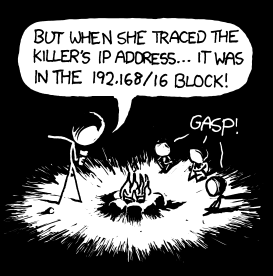 I saw the following cartoon and thought, “What a great story idea!”, and then I had to stop myself.
I saw the following cartoon and thought, “What a great story idea!”, and then I had to stop myself.
What is obvious to me is gibberish to you.
First, IP Address is like your computer’s phone number. It is how the world sees your computer and how you can find other computers.
Second, the 192.168/16 block is a special set of addresses that cannot be routed, which means that any traffic from this block of numbers will not find its way into the outside world.
Third, Internet Routers, like the one you got from the cable company, use NAT (Network Address Translation) to automatically convert your internal number to an IP address that the world can see. Since the outside world cannot directly access your machine, you are somewhat protected behind this “firewall” of spoofed addresses.
Fourth, If your machine is hit with a 192.168.*.* IP address (other than the router’s gateway address) it means that the killer is communicating with you from inside the firewall.
Conclusion: THE KILLER IS IN THE HOUSE!
It’s a great idea, and maybe it could use it on the TV show NCIS if they said it fast enough, and it was not real important for the over-all plot. But, if I used it in a story where it was integral to the whole concept, I would spend half the story teaching the reader how the internet works.
I often have this problem because many of my stories involve: Information Theory, Programming Algorithms, Artificial Intelligence, Astrophysics, Relativity, or Vacuum Tubes.
I have three stories where I used the word heterodyne, which is great word, but is not in any of my spell checkers, and would be meaningless to 99.9% of my potential readers.
I did not add this to my grand list of great story ideas, characters and plot points.
2 Comments
Most people like to learn something when they read a story, so if you didn’t make it too cryptic, I think it would be fine. For example, on CSI they have little tidbits about new tech items all the time, but they don’t belabor it, they just give the highlights so you know why everyone cares about it story-wise.
Being able to do this well is called “Heinleining” as Robert A. Heinlein, probably the greatest Science Fiction writer, was the master of explaining technology without getting in the way of the story.